August 2023
Types of Hammertoe Surgery
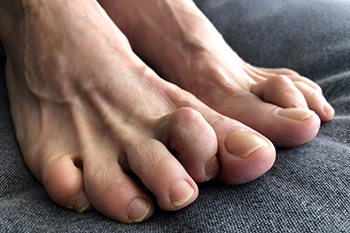
Early intervention in managing painful hammertoes can prevent the need for surgery. However, for some individuals, surgery may become a viable option. It is important to address underlying factors such as rheumatoid arthritis prior to considering surgery. A number of surgical options are available, depending on the severity or advancement of the hammertoe. Tendon transfer, suitable for flexible hammertoes, involves repositioning tendons to improve alignment and appearance. Joint resection is beneficial for fixed hammertoes. This procedure consists of adjusting ligaments, tendons, and bone portions. Fusion is generally reserved for severe fixed hammertoes that may require this approach. Joint portions are removed to stimulate bone growth and straighten the toe. Toe removal is employed only in rare cases of extreme pain, although it comes with significant considerations. Surgery is often performed as an outpatient and can involve local anesthesia. Strengthening exercises and wearing proper footwear can help to aid in recovery. For guidance on managing a hammertoe, it is suggested that you consult with a podiatrist for treatment options.
Hammertoe
Hammertoes can be a painful condition to live with. For more information, contact one of our podiatrists from Advanced Foot & Ankle Associates, PLLC. Our doctors will answer any of your foot- and ankle-related questions.
Hammertoe is a foot deformity that affects the joints of the second, third, fourth, or fifth toes of your feet. It is a painful foot condition in which these toes curl and arch up, which can often lead to pain when wearing footwear.
Symptoms
- Pain in the affected toes
- Development of corns or calluses due to friction
- Inflammation
- Redness
- Contracture of the toes
Causes
Genetics – People who are genetically predisposed to hammertoe are often more susceptible
Arthritis – Because arthritis affects the joints in your toes, further deformities stemming from arthritis can occur
Trauma – Direct trauma to the toes could potentially lead to hammertoe
Ill-fitting shoes – Undue pressure on the front of the toes from ill-fitting shoes can potentially lead to the development of hammertoe
Treatment
Orthotics – Custom made inserts can be used to help relieve pressure placed on the toes and therefore relieve some of the pain associated with it
Medications – Oral medications such as anti-inflammatories or NSAIDs could be used to treat the pain and inflammation hammertoes causes. Injections of corticosteroids are also sometimes used
Surgery – In more severe cases where the hammertoes have become more rigid, foot surgery is a potential option
If you have any questions please contact one of our offices located in Lake Worth and Aledo/Willow Park, TX . We offer the newest diagnostic and treatment technologies for all your foot and ankle needs.
Finding the Proper Work Shoes
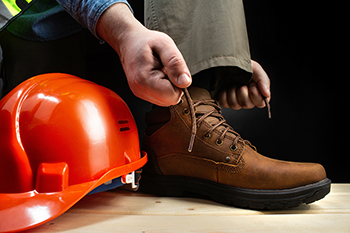
When it comes to your workday, the right pair of appropriate work shoes can make all the difference. Spending hours on your feet can be grueling, especially if you're not wearing the proper footwear. Ill-fitting or worn-out shoes can lead to discomfort and even foot problems that linger long after you've left the workplace. Particular caution is needed with pointed-toe or high-heeled shoes, as they can create a host of issues. Lack of arch support, inadequate cushioning, and non-shock-absorbing shoes also contribute to workplace foot problems. Shoes that are too loose or too tight are equally problematic. For labor-intensive roles, like construction, more durable work shoes are essential. Foot pain and disorders often arise due to prolonged standing. Your feet are built for movement, so immobilization can lead to joint misalignment and inflammation. Ventilation is also key. In hot environments, non-porous uppers can lead to sweaty feet and fungal infections. Business casual or dress shoes require consideration of any foot issues. Non-slip outsoles are vital if you're frequently on the move at work, such as may be experienced by restaurant or hospital workers. If you are experiencing foot, heel, or ankle pain as a result of working on your feet for long periods, it is suggested that you consult a podiatrist for an exam and treatment options.
While working on the feet, it is important to take the proper care of them. For more information about working on your feet, contact one of our podiatrists from Advanced Foot & Ankle Associates, PLLC. Our doctors will treat your foot and ankle needs.
Working on Your Feet
Standing on your feet for long periods of time can cause stress and pain in your feet. Your whole body may experience change in terms of posture, back pain, bunions, callouses and or plantar warts. There are ways to avoid these conditions with proper foot care, smart choices and correct posture.
Positive Changes
Negative heeled shoe – Choosing this shoe type places the heel slightly lower than the ball of the foot. These are great for overall foot health. Find shoes that fit you correctly.
Go barefoot – Our feet were not designed to be enclosed for all hours of the day. Try to periodically expose your feet to air.
Eliminate Pain
Foot Exercises – Performing simple exercises, incorporating yoga and doing stretches are beneficial. This will allow increased blood flow to the area and muscles of the foot.
Achilles tendon – Stretching the foot out flat on the floor will relax the calf muscles and tendon. These exercises can be performed almost anywhere. Make sure you add these exercises to your daily regimen.
With a little bit of this information and knowing more about foot health, you will notice changes. Foot stretches and proper footwear will help with pain and prevent further issues.
If you have any questions please feel free to contact one of our offices located in Lake Worth and Aledo/Willow Park, TX . We offer the newest diagnostic and treatment technologies for all your foot and ankle needs.
How High Heels Can Affect the Feet
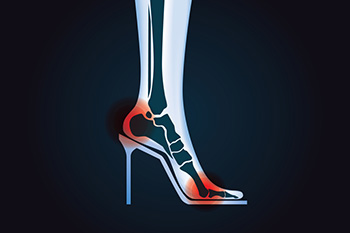
High heels may add elegance and style to an outfit, but their impact on our feet is far from glamorous. The unnatural position of the foot in high heels puts excessive pressure on the toes, leading to bunions, corns, and calluses. Because the heel is elevated while high heels are worn, it can cause Achilles tendon tightness and calf muscle strain, leading to discomfort and reduced flexibility. High heels also shift the body weight forward, increasing the risk of ankle sprains and instability. Prolonged use of high heels can even alter the natural arch of the foot, leading to plantar fasciitis and other painful conditions. To reduce these risks, it is suggested that high-heel wear be limited and the shoes that are worn have low heels or supportive wedges. If you have foot pain from wearing high heels, it is suggested that you speak to a podiatrist who can help you find additional relief options.
High heels have a history of causing foot and ankle problems. If you have any concerns about your feet or ankles, contact one of our podiatrists from Advanced Foot & Ankle Associates, PLLC. Our doctors can provide the care you need to keep you pain-free and on your feet.
Effects of High Heels on the Feet
High heels are popular shoes among women because of their many styles and societal appeal. Despite this, high heels can still cause many health problems if worn too frequently.
Which Parts of My Body Will Be Affected by High Heels?
- Ankle Joints
- Achilles Tendon – May shorten and stiffen with prolonged wear
- Balls of the Feet
- Knees – Heels cause the knees to bend constantly, creating stress on them
- Back – They decrease the spine’s ability to absorb shock, which may lead to back pain. The vertebrae of the lower back may compress.
What Kinds of Foot Problems Can Develop from Wearing High Heels?
- Corns
- Calluses
- Hammertoe
- Bunions
- Morton’s Neuroma
- Plantar Fasciitis
How Can I Still Wear High Heels and Maintain Foot Health?
If you want to wear high heeled shoes, make sure that you are not wearing them every day, as this will help prevent long term physical problems. Try wearing thicker heels as opposed to stilettos to distribute weight more evenly across the feet. Always make sure you are wearing the proper shoes for the right occasion, such as sneakers for exercising. If you walk to work, try carrying your heels with you and changing into them once you arrive at work. Adding inserts to your heels can help cushion your feet and absorb shock. Full foot inserts or metatarsal pads are available.
If you have any questions please feel free to contact one of our offices located in Lake Worth and Aledo/Willow Park, TX . We offer the newest diagnostic and treatment technologies for all your foot and ankle needs.
Do Your Child's Feet Hurt?
Understanding Toddlers' Growing Feet and Shoe Requirements
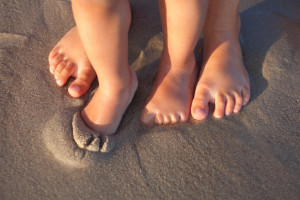
Toddlers' feet grow at an unpredictable rate, just like their ever-changing moods and preferences. Between ages 1 and 3, a child's foot typically grows about 1/2 to 3/4 inches per year, with occasional growth spurts leading to rapid changes in shoe size. Trying to measure their feet monthly can be a challenge, so monitoring how well their shoes fit is the best way to gauge their growth. It is common for toddlers to require two or three different shoe sizes within a year, which may seem costly but is a natural part of their development. After age 3, foot growth slows to about 1/2 inch per year until reaching adult size. When shopping for shoes, it is crucial to check the fit regularly, ensuring there is enough space for the toes. Non-slip soles are essential for toddlers, as they are still developing coordination. Opt for shoes with easy fastening, like hook-and-loop tape, as toddlers are not yet ready to tie laces independently. Parents can support their toddlers' healthy foot development by choosing the right-sized and comfortable shoes during these crucial early years. If you would like more help in understanding your toddlers’ growing feet and proper shoe selection, it is suggested that you make an appointment with a podiatrist.
The health of a child’s feet is vital to their overall well-being. If you have any questions regarding foot health, contact one of our podiatrists of Advanced Foot & Ankle Associates, PLLC. Our doctors can provide the care you need to keep you pain-free and on your feet.
Tips for Keeping Children's Feet Healthy
- Make sure their shoes fit properly
- Look for any signs of in-toeing or out-toeing
- Check to see if they have Clubfoot (condition that affects your child’s foot and ankle, twisting the heel and toes inward) which is one of the most common nonmajor birth defects.
- Lightly cover your baby’s feet (Tight covers may keep your baby from moving their feet freely, and could prevent normal development)
- Allow your toddler to go shoeless (Shoes can be restricting for a young child’s foot)
- Cut toenails straight across to avoid ingrown toenails
- Keep your child’s foot clean and dry
- Cover cuts and scrapes. Wash any scratches with soap and water and cover them with a bandage until they’ve healed.
If you have any questions, please feel free to contact one of our offices located in Lake Worth and Aledo/Willow Park, TX . We offer the newest diagnostic and treatment technologies for all your foot care needs.
Foot Care Tips for Diabetics
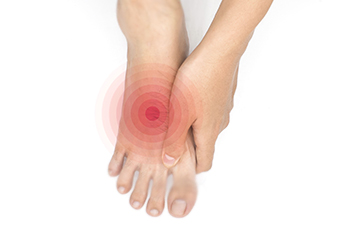
A common side effect of diabetes is the tendency to develop peripheral neuropathy and circulation problems. Both are the result of long-term high blood sugar levels. As a result, the feet may become numb and the ability to heal may be impeded. These consequences can lead to the development of foot ulcers. Because the feet become numb, cuts and cracks in the skin may not be felt, and because of arterial disease that constricts the blood vessels to the extremities, healing takes longer. For those reasons, a daily routine of foot care is essential to anyone with diabetes. Medical professionals, such as podiatrists, suggest that washing and drying the feet daily is a must. Examining the feet for sores or cuts should happen daily. Keeping the feet elevated as often as possible is also a good idea. Experts also recommend changing to footwear that fits well, and wearing socks can help to protect the feet. For treatment of foot problems related to diabetes, it is suggested that you make regular visits to a podiatrist.
Diabetic foot care is important in preventing foot ailments such as ulcers. If you are suffering from diabetes or have any other concerns about your feet, contact one of our podiatrists from Advanced Foot & Ankle Associates, PLLC. Our doctors can provide the care you need to keep you pain-free and on your feet.
Diabetic Foot Care
Diabetes affects millions of people every year. The condition can damage blood vessels in many parts of the body, especially the feet. Because of this, taking care of your feet is essential if you have diabetes, and having a podiatrist help monitor your foot health is highly recommended.
The Importance of Caring for Your Feet
- Routinely inspect your feet for bruises or sores.
- Wear socks that fit your feet comfortably.
- Wear comfortable shoes that provide adequate support.
Patients with diabetes should have their doctor monitor their blood levels, as blood sugar levels play such a huge role in diabetic care. Monitoring these levels on a regular basis is highly advised.
It is always best to inform your healthcare professional of any concerns you may have regarding your feet, especially for diabetic patients. Early treatment and routine foot examinations are keys to maintaining proper health, especially because severe complications can arise if proper treatment is not applied.
If you have any questions please feel free to contact one of our offices located in Lake Worth and Aledo/Willow Park, TX . We offer the newest diagnostic and treatment technologies for all your foot and ankle needs.
Blog Archives
- April 2025
- March 2025
- February 2025
- January 2025
- December 2024
- November 2024
- October 2024
- September 2024
- August 2024
- July 2024
- June 2024
- May 2024
- April 2024
- March 2024
- February 2024
- January 2024
- December 2023
- November 2023
- October 2023
- September 2023
- August 2023
- July 2023
- June 2023
- May 2023
- April 2023
- March 2023
- February 2023
- January 2023
- December 2022
- November 2022
- October 2022
- September 2022
- August 2022
- July 2022
- June 2022
- May 2022
- April 2022
- March 2022
- February 2022
- January 2022
- December 2021
- November 2021
- October 2021
- September 2021
- August 2021
- July 2021
- June 2021
- May 2021
- April 2021
- March 2021
- February 2021
- January 2021
- December 2020
- November 2020
- October 2020
- September 2020
- August 2020
- July 2020
- June 2020
- May 2020
- April 2020
- March 2020
- February 2020
- January 2020
- December 2019
- November 2019
- October 2019
- September 2019
- August 2019
- July 2019
- June 2019
- May 2019
- April 2019
- March 2019
- February 2019
- January 2019
- December 2018
- November 2018
- October 2018





